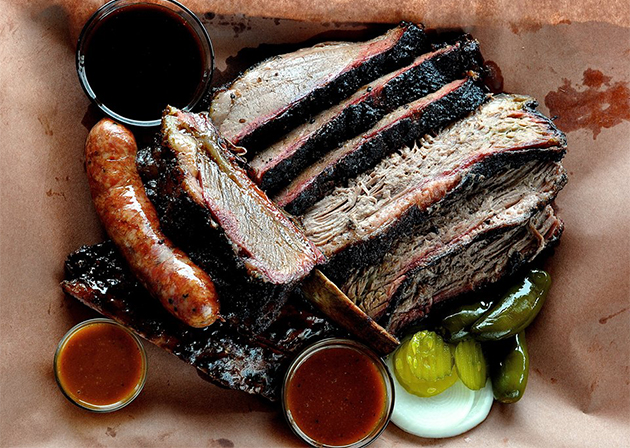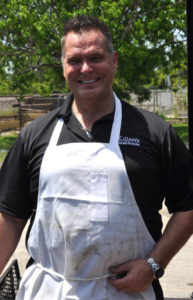
In 2012, Ronnie Killen, a Cordon Bleu-trained chef and owner of Killen’s Steakhouse in Houston, announced that he would be expanding — not with another steakhouse, but with a barbecue restaurant. Soon after, he began wooing the public with weekend barbecue pop-ups that drew massive crowds and gained legions of followers, all eagerly awaiting the opening of his brick-and-mortar establishment.
When it finally opened its doors in February, it was clear that Killen’s Barbecue was destined for greatness. Long lines formed each morning, well in advance of the restaurant’s actual opening time. Thousands of pounds of barbecue sold out in a matter of hours. Barbecue legends and food critics alike heaped praise on Killen’s ’cue, which was glorious: glistening, melt-in-your-mouth brisket; impossibly large beef ribs; smoked turkey; barbecue chicken; bone-in pork belly; pork ribs; and housemade sausages.
“The best barbecue period.” It’s a bold statement, but it’s Killen’s motto; and as he describes in our interview, he works hard to make sure that he has the goods to back it up.
What made you decide to go down this path of barbecue when you already had such a successful steakhouse?
The smoking and barbecuing kind of happened when I was a guest chef at the James Beard House back in September 2011. For me, it’s going back to my roots and doing something that I really enjoy. That’s one of the reasons why I think it’s successful — because if you enjoy doing it, you’re going to do it well.
You are actually a trained chef. Do you think it takes being a chef to really master the art of barbecue? It is an art, isn’t it?
Absolutely. I have people who have culinary degrees that will work with me and for me in the steakhouse, and they don’t get barbecue whatsoever. People either have that natural ability or they don’t. You can teach and train, you can show and you can give guidelines, and you can try to do what you can do to show someone how to do it; but at the end of the day, if they don’t get it, they probably never will. So that’s what makes it so difficult. I understand it because it’s something that I’ve been around and been doing all my life.
How long did you take to perfect it?
There are days here where everything tastes great, and there are days where we have some issues. For the most part, everybody that has come in here, just flips out over what we do. Even though I may think that it may not be as good as it could be, they love it because there’s a lot of barbecue out there that is just OK. When you think about barbecue and you think about cooking it, you forget about all the time that’s spent monitoring the fire, watching it, making sure it doesn’t burn, making sure that the temperature doesn’t fluctuate, understanding how the wetness or dryness of the woods can throw a wrench into what you’re doing. So, perfecting the temperature and the fire is really one of the most important things in barbecuing. It’s not just about watching a temperature gauge. It’s not about sticking a thermometer in the meat. I don’t stick my briskets. I feel them, and if they don’t feel right, we’ll just keep on cooking them.
What is a typical day like for you as a pit master?
I get up around 2:30 or 3 o’clock in the morning. I get to the restaurant around 4 or 5 a.m., and then there’s the process of taking the brisket off, or taking meats that are cooked off and replacing them with beef ribs, pork ribs. Everything’s got a time and a schedule of when they go on and when they come off. The briskets go on between 3 and 4 p.m. the day before, and they’re done when they’re done; it can be 12 hours, 15 hours — every one is different. Then the process starts all over again and you get ready for service. I typically go home around 10 at night; so we’re talking 16- to 17-hour days. I want to say it’ll get easier, but we don’t know what people will order when they first walk in. Usually the first hour of service is crazy because people who have been standing in line to get here are not getting just one pound of meat or one barbecue plate — they’re getting several pounds.
How many pounds are you cooking per day?
On the pop-ups, we were doing 1,200 to 1,500 pounds of meat. Right now, we’re doing close to 2,000 to 2,100 pounds of meat. If we cook it, we can sell it. We’re cooking as much as we can. I’m getting ready to send my dad to Florida to pick up a big barbecue pit to bring back so we can cook more because I don’t want people mad; I don’t want people upset about the line. I’m one of those people who tries to make people happy. That’s one of the things we’ve been trying to research. We are averaging 62 transactions per hour, which is less than a minute per transaction. A fast-food goal is about 90 seconds. So, if we can serve each person faster than a fast-food restaurant, I think we’re doing good.
What sets your barbecue apart from other places?
What sets my barbecue apart is this: You’re basically eating stuff that came off the pit not long ago. It’s not sitting in a warming cabinet all day. We also use good meat. We use prime beef. We use Creekstone Farms. We get a lot of our meat from Allen Brothers in Chicago — considered the best meat company in the United States. We use the best product we can. We make our own sausage every day; it’s incredible. We don’t use processed anything. We take turkey breast right off the bone for our smoked turkey breast. It’s about the product. We use salt and pepper on it, and that’s it. You’re eating the ingredient for what it is. It’s not covered up. We let the product speak for itself and we cook it right.
I have nothing to gain by serving mediocre barbecue and I’m not going to do it. If something doesn’t feel right to me, I’ll discard it. I’ll just put it to the side and start over because I want everyone to have “the best barbecue period.” I have to put my money where my mouth is and I believe that we do. I want to put Houston on the map as the best barbecue place. Not Austin. So that’s my main goal. The very first time I met Aaron [Franklin, of Franklin Barbecue in Austin], I told him: “You don’t know me now, but you will soon.” And he does. Our first week of business, Aaron Franklin was here. So obviously, he knows who I am.
Photos Courtesy of Kimberly Park


